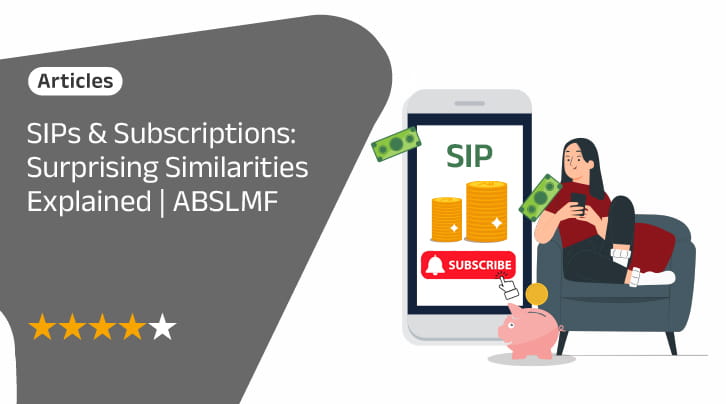-
Our Products
Our FundsTop Performing Funds
-
Self Care
Self-ServiceFind InformationWays To TransactPartner Solutions
-
Downloads
- Learnings
- About Us
-
More
-
Shareholders
-
Shareholders
-
Updates
-
-
SIP Calculators
- Back
-
Shareholders
What SIPs and subscription services have in common?

Mar 22, 2025
5 min
4 Rating
SIPs and subscriptions have similar operating structures. However, the way to approach them in the long term is different. Let’s find out.
In today’s world, a customer consumes most products and services through subscriptions. Ordering food, reading the newspaper, listening to music, watching movies on OTT or DTH, shopping, going to the gym or yoga, swimming pool, learning a course, medical test, pest control, AC repair, personal care, ride share, there are subscriptions for most of the things. Subscriptions have given businesses a way to retain customers and generate sustainable revenues. But why are we talking about subscriptions?
What subscriptions are to customers and businesses, systematic investment plans (SIPs) are to investors and the stock market. They both work on the principle of increasing accessibility to goods and services by making them affordable through recurring transactions.
How SIP works
A Systematic Investment Plan as the name suggests creates an investment system that allows you to make regular contributions to mutual fund schemes at defined frequencies of your choices. You select the amount you want to invest, the investment tenure, and when the SIP will be debited from your account. Once activated, the asset management company automatically debits the SIP amount and invests in the mutual fund scheme selected. Investors can pause SIP if they fall into financial trouble and top-up the amount if their income increases. SIP flexibility has made mutual funds a go-to investment option for many investors.
How subscription works
A subscription gives customers access to goods and services in exchange for a fee. Customers can choose from various subscription plans that meet their requirements and budget. Some subscriptions are for a tenure which customers can renew or cancel anytime. Subscriptions give them the flexibility to use expensive goods or services that they would have not used otherwise. This flexibility has made subscriptions a preferred business model for most businesses.
What do SIPs and subscription services have in common?
Convenient: Subscriptions have made consumption convenient. For instance, you don’t need to buy a newspaper every day from the vendor. A subscription will ensure the newspaper is delivered to your doorstep. Similarly, you don’t need to manually invest in the mutual fund scheme every month. A SIP makes it convenient by automatically investing your money in the selected mutual fund scheme. Even if you forget to invest, the SIP won’t forget.
Accessible: You can begin your subscription for most of the services online with your bank account or UPI thereby ensuring seamless access to goods and services. You can start a SIP online if you have online banking or UPI, making investing accessible to all.
Recurring: Subscriptions ensure recurring sales as the amount is automatically debited from the customer’s bank account. Similarly, SIPs ensure you are investing regularly in all the market conditions through auto-debits.
Market updates: Subscriptions not only give customers access to goods and services but also any additions and improvements to the offering. For instance, a streaming service keeps adding and removing content. Similarly, SIPs give investors access to market volatility. SIP invests a fixed amount every month, in the chosen mutual fund scheme irrespective of the market environment. When the market is bullish fewer units are added and when the market is bearish more units are added, reducing the average cost per unit.
Cost-efficient: Buying a streaming service subscription gives you access to a whole library of content, which is cheaper than buying a DVD for a movie. Similarly, SIP gives you access to a diversified portfolio of multiple stocks, which is cheaper than buying individual stocks.
Affordable: A basic subscription plan starts at a lower cost, making it affordable to most customers. The SIP amount can be for as little as Rs 100 with no maximum limit, making investing affordable to all.
Flexible: Subscriptions are flexible as you can upgrade, renew, cancel, and restart them anytime. Similarly, you can step-up, , pause, and restart your SIP anytime by opting for regular SIP, flexible SIP, top-up SIP, and perpetual SIP depending on your requirement.
Discover new products: As subscriptions are affordable and build strong customer relations, it helps customers discover other products the company offers. As SIPs allow investors to invest small amounts they can explore other mutual fund schemes to get exposure to other asset classes and diversify their investment portfolio.
How to approach SIPs and subscriptions in difficult times
SIPs and subscriptions have many common traits that make them the go-to option for investing and consuming goods and services. However, there is a different way to approach them in difficult times.
When the goods and services no longer add value you may cancel the subscription. However, when the stock market declines, many investors panic and stop their SIPs over the fear of losing money. Stopping SIP in a bear market is an overreaction and could reduce the potential benefit of SIP.
The way SIP works, it buys more units in a bear market which helps it reduce the average cost per unit. When the market is bullish, the lower average cost per unit helps boost your portfolio. The idea behind SIP is to help investors invest regularly and stay invested for the long term.
Investing is not about timing the market but spending time in the market with patience.
Start an SIP, stick to it for the long term, and let the system of regular investing run its course.
SIP does not assure a profit or guarantee protection against loss in a declining market.
Mutual Fund investments are subject to market risks, read all scheme related documents carefully.





 1800-270-7000
1800-270-7000



